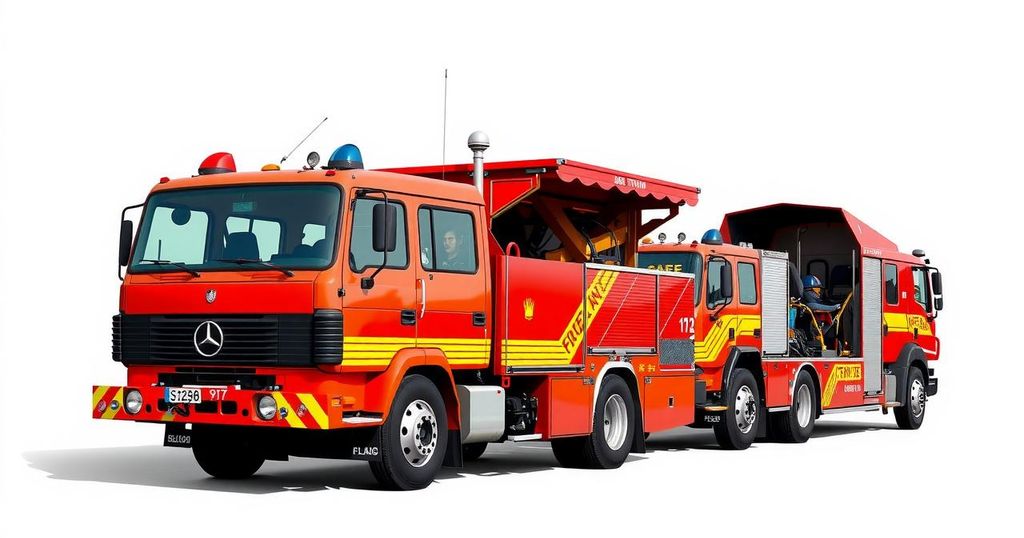Lithuania has caused an uproar by donating 17 fire engines, originally meant for Zimbabwe, to Ukraine. Analysts criticized this move as unlawful and highlighted the adverse effects of Western sanctions on Zimbabwe. The Zimbabwean government is demanding the return of the vehicles, emphasizing their importance for emergency services.
Lithuania’s recent action to donate 17 fire engines, originally intended for Zimbabwe, to Ukraine has incited significant criticism, with political analysts deeming the act both unlawful and discriminatory. The fire trucks, procured by Zimbabwe from Belarus, were confiscated by Lithuanian authorities during transit to Harare, prompting an outcry from the Zimbabwean government, which is demanding their return. Advocate Obert Gutu, a prominent political analyst, expressed his discontent, labeling the situation as “shameful, scandalous, and unlawful.” He emphasized that the fire engines, which were legitimately purchased by Zimbabwe, constitute the rightful property of a sovereign nation. Gutu stated, “Lithuania has no legal right, under both public and private international law, to confiscate and donate the fire engines to Ukraine or any other country without Zimbabwe’s consent. This situation should not be allowed to stand. Zimbabwe is being unfairly caught in the crossfire of disputes between Lithuania and Belarus.” Furthering this discourse, political analyst Mr. Tongai Dana criticized the ramifications of Western sanctions, which facilitated the confiscation of the fire engines. He highlighted the critical nature of fire engines for emergency services and infrastructure, arguing that the loss of these resources undermines Zimbabwe’s capacity to efficiently respond to disasters. Dana remarked, “The confiscation of these fire engines is a stark example of how Western sanctions negatively impact ordinary people. While these measures are meant to pressure governments, it is the vulnerable citizens who suffer most. This underscores the moral dilemma surrounding sanctions, particularly when they hinder essential services.” Mr. Shadreck Mashayamombe, another analyst, characterized Lithuania’s action as “callous,” asserting that fire engines serve the vital purpose of life-saving emergency services. He argued that their confiscation exemplifies the indiscriminate harm caused by sanctions to nations. “Our rights are being violated,” Mashayamombe stated. “This issue needs to be resolved diplomatically, not by redirecting Zimbabwe’s property to another country.” Amid growing diplomatic tensions, the Zimbabwean government continues to call for the return of the fire engines as discussions to resolve the issue intensify.
The context surrounding the donation of fire engines from Lithuania to Ukraine originates from geopolitical tensions involving multiple nations. The fire engines were initially purchased by Zimbabwe from Belarus but were intercepted by Lithuanian authorities during their transit to Zimbabwe. This interception has led to a diplomatic dispute, with Zimbabwean officials asserting their sovereign right to these essential vehicles, which are crucial for emergency services in their country. While Lithuania’s intentions may be framed within the context of supporting Ukraine amid ongoing conflict, the decision to divert Zimbabwe’s property has drawn ire from various political analysts who argue that such acts breach international law and violate Zimbabwe’s sovereignty.
In summary, Lithuania’s decision to donate Zimbabwe’s fire engines to Ukraine has been met with widespread condemnation from political analysts, who argue that the move is both unlawful and discriminatory. The incident underscores the negative impact of Western sanctions on ordinary citizens and raises concerns about the sovereignty of nations in geopolitical conflicts. As diplomatic efforts continue, the Zimbabwean government remains adamant in seeking the return of its property, emphasizing the importance of fire engines for its emergency services.
Original Source: bulawayo24.com






